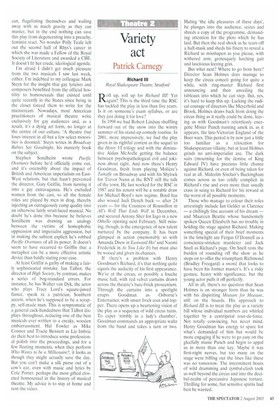Variety act
Patrick Camegy
Richard III Royal Shakespeare Theatre, Stratford
Roll up, roll up for Richard HP Yet again? This is the third time the RSC has tackled the play in less than five years. Is it on someone's exam syllabus, or are they just doing it for love?
In 1998 we had Robert Lindsay shuffling forward out of the snow into the wintry summer of his stand-up comedy routine. In 2001, more impressively, we had the play given in its rightful context as the sequel to the Henry VI trilogy and with the diminutive Aidan McArdle getting the balance between psychopathological evil and jokiness about right. And now there's Henry Goodman, fresh from playing MoHere's Tartuffe on Broadway and with his Shylock for Trevor Nunn at the RNT still the talk of the town. He last worked for the RSC in 1987 and his return will be a notable draw for Michael Boyd's new regime. Boyd has also wooed Judi Dench back — after 24 years — for the Countess of Roussillon in All's Well That Ends Well in December, and secured Antony Sher for lago in a new Othello opening next February. Still missing, though, is the emergence of new talent nurtured by the company. It has been glimpsed in action (memorably so with Amanda Drew in Eastward Ho! and Naomi Frederick in As You Like It) but must also be wooed and given its chances.
If there's a problem with Henry Goodman's Richard, it's that nothing quite equals the audacity of his first appearance. We're at the circus, or possibly a louche music hall, with red velvet curtains drawn across the theatre's bare-brick proscenium. Through the curtains into a spotlight erupts Goodman as Osborne's Entertainer, with smart frock coat and topper. There opens up a heartening vision of the play as a sequence of wild circus turns. To caper 'nimbly in a lady's chamber', Goodman commands an appropriate waltz from the band and takes a turn or two, Hating 'the idle pleasures of these days', he plunges into the audience, seizes and shreds a copy of the programme, demanding attention for the plots which he has laid. But then the real shock as he tears off a half-mask and sheds his finery to reveal a Richard as misshapen as you please, with withered arm, grotesquely lurching gait and lascivious leering grin.
But what next? Where to go from here? Director Sean Holmes does manage to keep the circus conceit going for quite a while, with ring-master Richard first announcing and then unveiling the tableaux into which he can step. But, yes, it's hard to keep this up. Lacking the radical courage of directors like Meyerhold and Brook, Holmes draws back from doing the circus thing as it really could be done, leaving us with Goodman's relentlessly energetic Mister Punch running amok in, as it appears, the late-Victorian England of the Boer wars. This period is by now just a little too familiar as a relocation for Shakespearean villainy, but at least Holmes grinds no anti-imperialist axe. The dark suits (mourning for the demise of King Edward IV) have precious little chance against Richard, or even of being taken for real at all. Malcolm Sinclair's Buckingham comes across as too coldly complicit in Richard's rise and even more than usually crass in suing to Richard for his reward at the worst of all possible moments.
Those who manage to colour their roles arrestingly include Ian Gelder as Clarence — a chillingly fine account of his dream — and Maureen Beattie whose handsomely spoken Queen Elizabeth has no trouble in holding the stage against Richard. Making something special of their brief moments in the limelight are Fergus O'Donnell as a conscience-stricken murderer and Jack Snell as Richard's page. On Snell rests the burden of rounding off the show as he steps on to offer the triumphant Richmond (Bradley Freegard) a sword that looks to have been his former master's. It's a risky gesture, heavy with significance, but the young actor pulls it off perfectly.
All in all, there's no question that Sean Holmes is on stronger form than he was with his dispiriting Measure for Measure, still on the boards. His approach to Richard III is to treat the play as a variety bill whose individual numbers are whirled together by a centripetal tour-de-force. Not totally convincing, but never mind. Henry Goodman has energy to spare for what's demanded of him but would be more engaging if he were to go easy on the gleefully manic Punch and begin to appal us in more than one key. Maybe it was first-night nerves, but too many on the stage were biffing out the lines like there was no tomorrow. The intermittent bouts of wild drumming and cymbal-clash took us well beyond the circus and into the decibel-realm of percussive Japanese torture. Thrilling for some, but sensitive spirits had best be warned.


























































 Previous page
Previous page